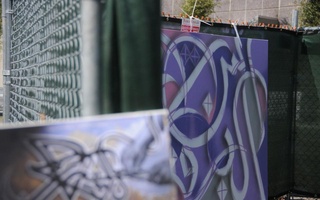UPDATED: March 10, 2015, at 9:53 p.m.
Kirsi Anselmi-Stith ’18 hails from Rock Springs, Wyoming. But when she walks into her introductory Arabic class every day, she finds herself next to students with more experience speaking the language, which she says can create an unbalanced learning environment.
“I have definitely come into contact with people who should be on my same level of Arabic but are so much faster that it makes it harder for me to learn,” she said. “A lot of the students had read the Islamic texts already, so they could recall words that I didn’t know.”
Anselmi-Stith’s experience in Arabic is not unique. While several languages at Harvard offer separate tracks for students with prior experience in the language, others—such as Arabic and Hindi-Urdu—do not divide their pupils into different tracks, leaving some students struggling to catch up to more experienced peers sitting next to them.
Chinese—one of the languages with a separate track for heritage speakers—offers sections that proceed not only at a faster pace than the regular classes but also include a specifically designed curriculum to cater to those with prior experience, according to Jennifer Li-Chia Liu, director of the Chinese language program. Heritage learners have been exposed to a language growing up.
“For example, for one of the assignments for the beginning heritage class, the instructor asks students to listen to a recording, because they are really good at listening,” Liu said. “But once they listen to the story, they have to type or write it. You won’t be able to do this type of activity with regular students, because it would take much longer to bring them up to the level of fluency.”
Along with Chinese, Korean offers separate classes for heritage speakers, according to Liu, because these East Asian languages are considered the most difficult for English speakers to learn. These departments are discussing expanding heritage offerings still further, Liu said.
Yet Arabic—also a difficult language for English speakers—intentionally has no such option.
Given the disparity between the written and spoken languages, the Modern Standard Arabic taught in Harvard classrooms does not privilege native Arab speakers because of its differences with the spoken dialect, said William E. Granara, an Arabic professor of the practice.
“If you speak with your grandmother at home and use Arabic around the dinner table, that does not get you to write a sentence,” he said.
David Max Korzen, a graduate student enrolled in an a second-year Arabic course who studied Arabic as an undergraduate and spoke it while enlisted in the military overseas, agreed with Granara that the grammatical differences between local dialects and Modern Standard Arabic are significant. However, he acknowledged that his experiences conversing in Arabic in the Middle East may have made him more confident in his speaking skills than his peers.
“The other students in the class, they know a lot of the basic grammar far better than I do, but they just don’t like to speak,” he said. “They’re so focused on the grammar that they get sort of wrapped around the axle, and they are not comfortable making mistakes.”
Like Anselmi-Stith, Korzen recalled frustration with the rapid progress of experienced students in his undergraduate classes at George Washington University.
Some native speakers in his classes, he said, "had a lot of exposure to this language, and yet they were in introductory classes with me, so they had a leg up.”
While the College adminsters language placement exams, Granara said there have been cases when heritage speakers “slip through the cracks” and intentionally place into a lower-level course. However, he said, initial differences between experienced speakers and first-time Arabic students tend to level out in time.
Read more in College News
New HUDS Initiative Donates Leftover Food to Local OrganizationsRecommended Articles
-
 Yugoslavian Oral History Project Removed from Science Center
Yugoslavian Oral History Project Removed from Science Center -
Reflections on an Earlier CairoI remember landing early evening in Cairo on June 13, 1973 as though it were yesterday, the sun still shining, the air hot and dusty.
-
 eL Seed Demonstrates Arabic Graffiti
eL Seed Demonstrates Arabic Graffiti -
Living World MusicIn short, I’m hung up on world music because it allows me to be more human.
-
Embrace the AbsurdIt’s all pretty much inherently absurd when you realize you’re worrying about letters on a piece of paper that already makes you elite.
-
With Back Bay Chorale, "Anything Can Happen"This Sunday, the Back Bay Chorale will be giving a whirlwind performance that includes the works of Mozart, Seamus Heaney, and rising composer Mohammed Fairouz. They will be performing Mozart's Requiem in D with Fairouz's "Anything Can Happen," a choral work inspired by Heaney's poetry.













